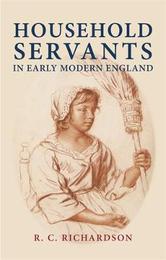
|
Household Servants in Early Modern England
Hardback
Main Details
| Title |
Household Servants in Early Modern England
|
| Authors and Contributors |
By (author) R Richardson
|
| Physical Properties |
| Format:Hardback | | Pages:272 | | Dimensions(mm): Height 216,Width 138 |
|
| Category/Genre | British and Irish History |
|---|
| ISBN/Barcode |
9780719068942
|
| Classifications | Dewey:640.46094209032 |
|---|
| Audience | |
|---|
| Illustrations |
Illustrations, black & white
|
|
Publishing Details |
| Publisher |
Manchester University Press
|
| Imprint |
Manchester University Press
|
| Publication Date |
1 May 2010 |
| Publication Country |
United Kingdom
|
Description
This lively socio-cultural history examines household service, one of the largest, multi-layered, mobile and most indispensable sectors of employment in early modern England. Drawing on a wide variety of cultural sources including literary depiction and self-representation, this study to brings into sharp focus individual life stories of Britain's servant class. Exploring the relationships between servants and between employers and servants; it depicts the differences between patterns of employment in London and the provinces, and the juxtaposition of servant vulnerability and servant 'power'. This book places new importance on the household servant as a major agent in cultural change and makes a significant contribution to our understanding of servitude in London and the provinces in the two centuries following the Reformation. -- .
Author Biography
R. C. Richardson is Emeritus Professor of History at the University of Winchester
ReviewsHousehold Servants in Early Modern England. By R. C. Richardson. (Manchester, England: Manchester University Press, 2010. Pp. xii, 259. $35.00.) Servants were everywhere in early modern England. Aristocrats employed dozens of them and even modest households could afford a maid-of-all-work. They were once part of the family and also employees who sold their labor on the open market. Service brought honor to nobles who waited on the king, yet servility entailed dishonor and dependence. Some claimed that servants lived carefree lives, but, for others, servitude was uncomfortably close to slavery. Service was indispensable to the economy, central to the household, and a fundamental aspect of this hierarchical society. R. C. Richardson 's survey of household servants in England from the sixteenth through the eighteenth centuries convincingly demonstrates their importance. He draws together much recent scholarship and adds his own readings of prescriptive and dramatic literature to show that servants were considered vital to the social order. A godly, obedient servant, Richardson shows, was said to be an important part of a functioning household. But servants' failure to achieve such high standards prompted writers like Daniel Defoe and Jonathan Swift to wring heir hands over the "servant problem." Though they were often victimized by cruel employers or unsympathetic magistrates, Richardson argues, servants were far from passive. Their places within the homes of England's elites could make them powerful, and many masters and mistresses lived in fear of their servants' ability to defame them through gossip or litigation. In Richardson's account, then, servants lived hard lives and yet, despite the ideals of obedience and humility preached in didactic literature, also took steps to improve their own condition. R. C. Richardson claims to provide a "social-cultural history," and, in many ways, he succeeds (viii). Readers learn much about representations, norms, and expectations. Additionally there is a wealth of detail describing the lives of real people working in service, particularly in chapter 5, which explores "housing, diet, dress, welfare, recreation, and education" (96). Specialists will appreciate the ways in which familiar material, such as William Betty's resuscitation of Anne Green or the popular politics of the English Civil War, are now seen in a new light when viewed through the lens of service. But such details, though often interesting, are too rarely synthesized into larger arguments regarding change over time. We read, for example, about the feminization of the service during the early modern period and of the transition from paternal to contractual relationships, but exactly when, how, or why these developments occurred is not explored. There is almost nothing on how demographic growth or economic expansion changed household service nor the effects of servants of class formation, urbanization, empire, or changing family structures. Altogether the reader gains the impression that service did not change much, despite the profound transformation associated with early modernity. Richardson shows, then, how the study of household servants contributes to our understanding of early modern English society and how much more there is to learn. This work will, therefore, be useful to specialists and to students as a survey of what is known and prompt future research. -- .
|